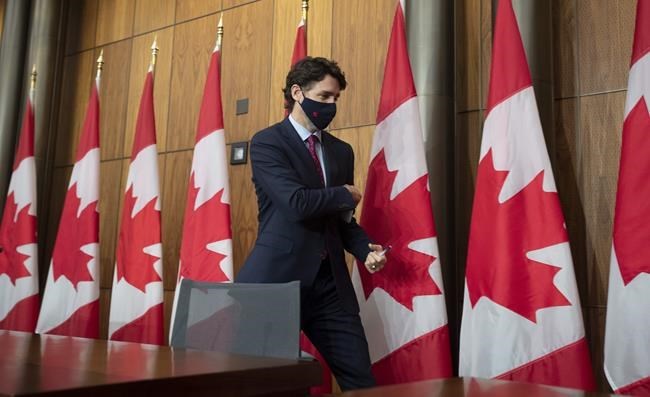OTTAWA — Premiers expressed disappointment Thursday after Prime Minister Justin Trudeau refused to accede to their demand for an immediate infusion of at least $28 billion more each year in annual federal transfers for health care.
Their complaints came after a daylong, virtual first ministers' meeting during which Trudeau promised that Ottawa will foot the bill for purchasing millions of doses of vaccines to inoculate Canadians against the novel coronavirus that causes COVID-19.
That's on top of the hundreds of billions of dollars the federal government has already spent fighting the deadly pandemic, including $25 billion in direct funding to provinces and territories to, among other things, help bolster their health systems.
Trudeau agreed the federal share of annual funding for health care must increase and said he's willing to discuss that longer-term issue once the pandemic is over. He gave no timeline for that but suggested it could be up to three years away.
In the meantime, he said the federal government is willing to fork out more money to bolster long-term care homes, which have been hardest hit by the pandemic, and to work with provinces interested in setting up a national pharmacare program.
None of that satisfied the premiers, who insisted that a big hike in the unconditional annual health transfer is what's needed to ensure the country's health system is sustainable over the long haul.
Quebec's Francois Legault, chair of the premier's council, said premiers were “very disappointed” by the meeting.
“Unfortunately, despite the premiers’ unanimous demand, Justin Trudeau refused to commit to substantially increase health transfers. He said that it was premature because of the COVID-19 (pandemic) to have this discussion," Legault said.
While he hadn't expected to come away from the meeting with a cheque for $28 billion, Legault said he had at least hoped the discussion would continue. Instead, he said, Trudeau refused a request to hold a second meeting devoted to the issue early in the new year.
Manitoba Premier Brian Pallister said the meeting gave the federal government "the opportunity to stand up for a quality, accessible and sustainable health-care system and resume its rightful role as a true funding partner, and they failed."
Still, Saskatchewan Premier Scott Moe said premiers were somewhat encouraged that Trudeau did agree the federal government eventually needs to pick up a bigger share of the health care tab.
"We were encouraged, and hopeful, that the premiers and the prime minister will be able to again regroup at some point in the new year to discuss this,” Moe said.
The federal government this year will transfer to the provinces nearly $42 billion for health care, under an arrangement that sees the transfer increase by at least three per cent each year.
But the premiers contend that amounts to only 22 per cent of the actual cost of delivering health care and doesn’t keep pace with yearly cost increases of about six per cent.
Starting next year, they want Ottawa to increase its share to 35 per cent and maintain it at that level, which would mean an added $28 billion, rising by roughly another $4 billion in each subsequent year.
Ontario Premier Doug Ford said closing "the long-standing and growing" gap in health funding was the "most critical issue" on the table at the meeting but it "remains unaddressed."
Ford asked that the issue be resolved in time for the spring federal budget.
Trudeau, however, was clear that's not in the cards.
"I told them ... that I recognize that this pandemic has exacerbated and highlighted the long-standing challenges faced by health-care systems across the provinces and territories and that the federal government will be there to step up its contributions," he told a news conference after the meeting.
"But we know that we need to do that in a way that is right for the coming years and the coming decades and right now there is a lack of certainty of what our economic situation or even our health situation might look like in three months, let alone in three years."
The federal government has racked up an unprecedented deficit of nearly $400 billion fighting the pandemic. Trudeau stressed that 80 per cent of the money spent to deal with the fallout from COVID-19 has come from the federal government.
While grateful for that funding, premiers say it's one-off cash that won't be renewed once the pandemic is over. What they're looking for is an agreement on predictable, stable, long-term federal funding as health care costs rise and the population ages.
In calculating that Ottawa pays only 22 per cent of the health care freight, the premiers include only the cash transfers they get from Ottawa. They do not include the billions in annual tax transfers they also get — essentially tax room vacated by the feds so that provinces and territories can increase their taxes to help pay for health care.
In a 2008 report, the auditor general of Canada pegged the value of the tax-transfer for health care at $12.6 billion.
Trudeau also announced Thursday that the federal government will create a federal support program on vaccine safety, to ensure anyone who experiences a severe adverse reaction to vaccines, including the COVID-19 vaccine, gets equal access to support.
So far, the government has committed more than $1 billion to purchase millions of doses of vaccine candidates. It has contracts with seven pharmaceutical companies to buy their vaccines if they prove safe and effective enough to get approval from Health Canada.
The vaccine from U.S.-based pharmaceutical company Pfizer and its German partner, BioNTech, received approval from the federal regulator on Wednesday and the first 30,000 doses are expected to be delivered early next week.
This report by The Canadian Press was first published Dec. 10, 2020.
Joan Bryden and Christopher Reynolds, The Canadian Press



